Boiling Basra: Residents afraid of their taps as Iraq's water crisis threatens to destabilise the region
Toxic water in Iraq’s oil-rich but water-poor south has hospitalised more than 90,000 people and sparked a wave of unrest. In the first in a new series, Water Wars, Bel Trew reports

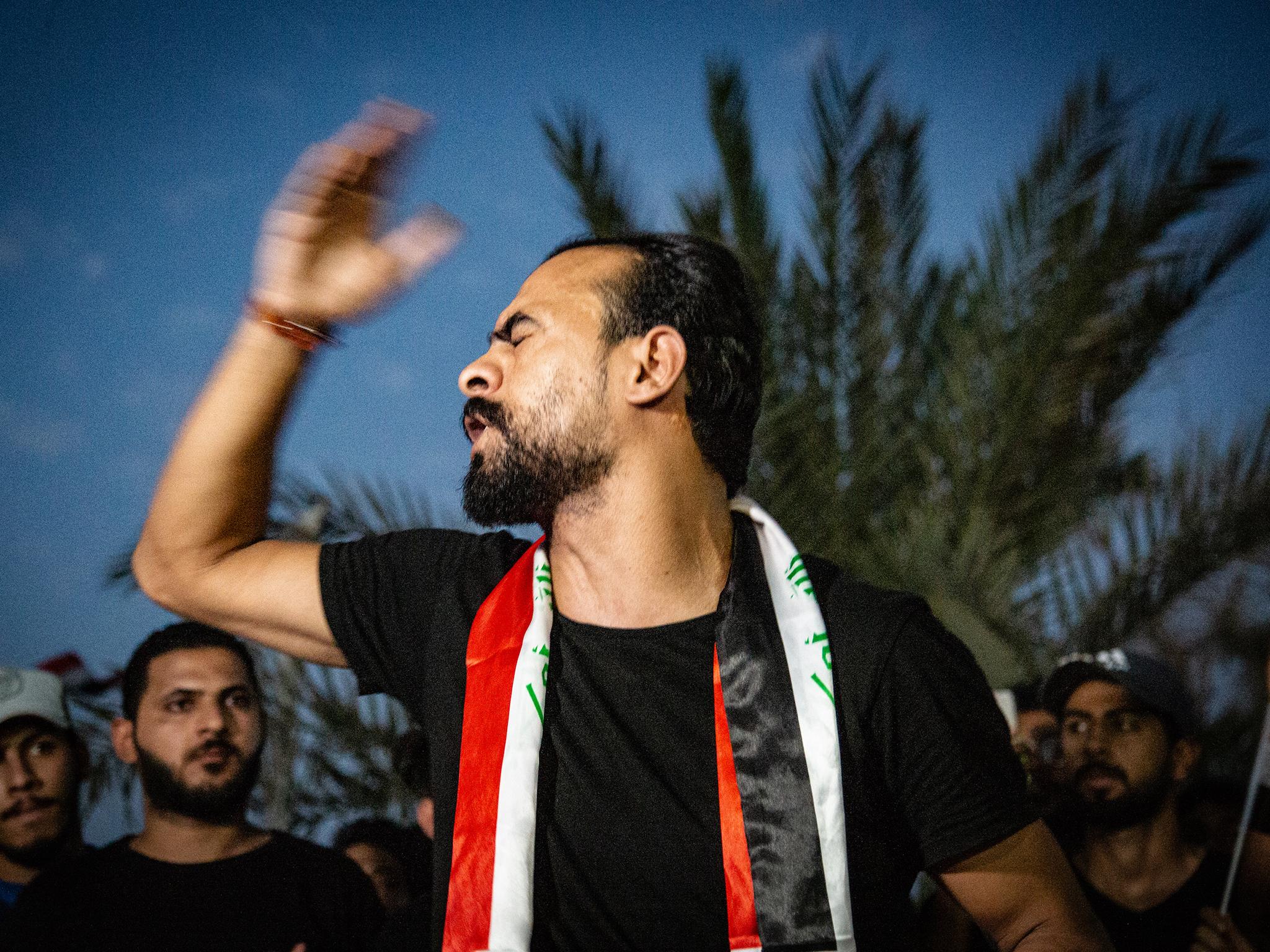
Chunks of salt the size of fists clutch the pipes of the ramshackle home where Hamid Abdul-Wahib, 44, lives in Basra, Iraq, once dubbed the “Venice of the east” for its abundance of waterways.
His breeze-block hut in Kut al-Thawani, an impoverished suburb of the city, is one of many that edge a simmering soup of rubbish and sewage.
The father-of-six has long given up trying to claw the crystals off taps that usually cough out disease-ridden saltwater, but which that day were running dry.
In the punishing summer heat, as temperatures crawl towards 50C, his family guard a crusted hose in the bathroom. They want to see whether, when the water returns, it will be clean enough to wash their clothes.
“It’s useless. You can’t even clean the dishes in it. Taste this glass, it’s saltier than the sea,” he says, pouring from a jug. It is so hot the heat stings.
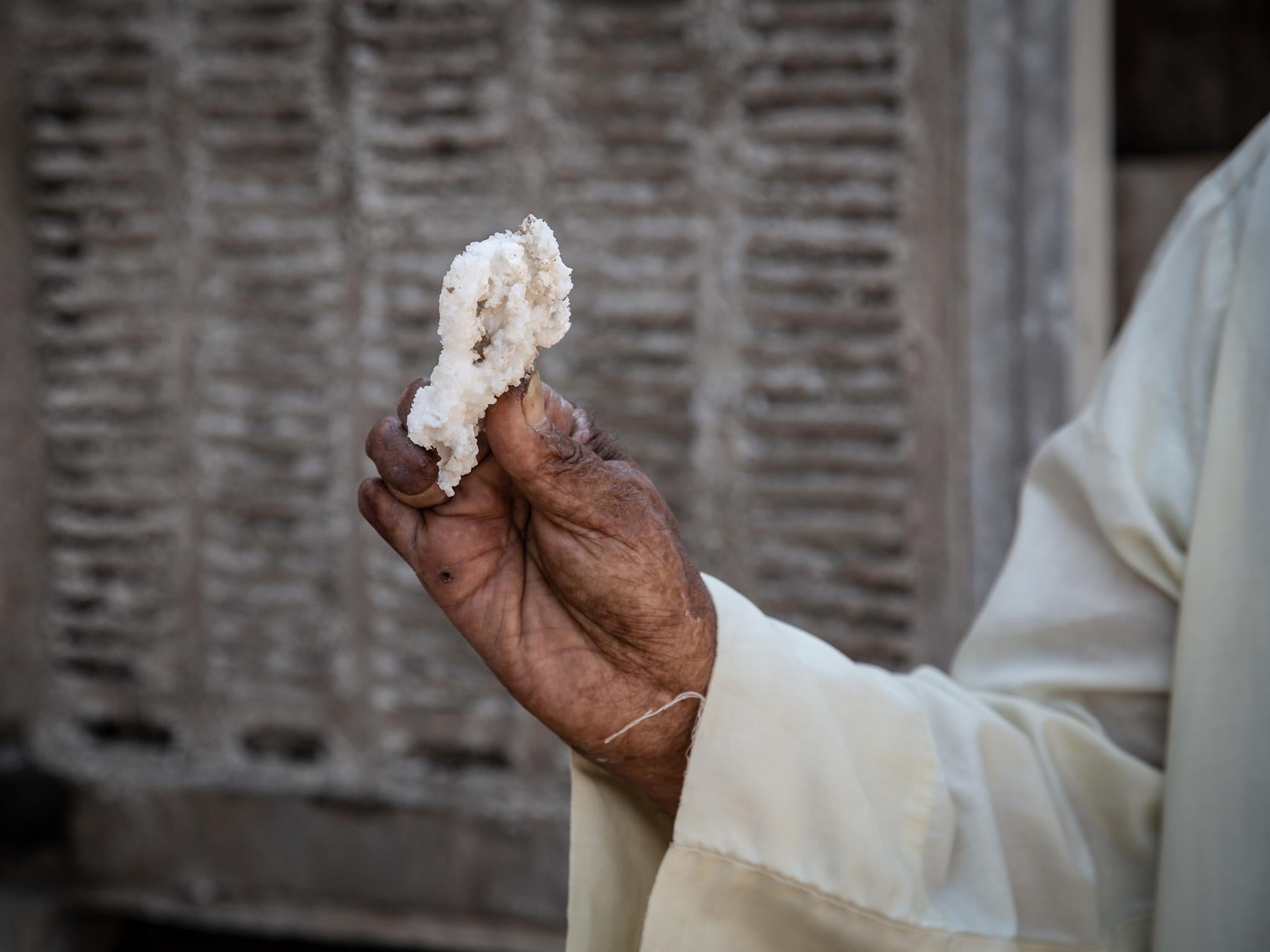
Basra’s water crisis is the final tipping point of a long list of woes in Abdul-Wahib’s home town that has been rocked by protests and riots since August. Thousands of people have poured onto the streets over the past month demanding water and proper services in a wave of unrest that saw parts of Basra go up in flames and threatened to unseat the country’s prime minister, Haider al-Abadi.
War-weary Iraq, which is reeling from a three-year battle to oust Isis, looked like it was about to implode. Water shortages, often dismissed as an unfortunate and soft side effect of the conflict, were suddenly threatening the stability of the region.
“It’s not just water,” Abdul-Wahib, a civil servant, continues, pointing to his two boys who sit neatly in a corner.
“We lack electricity, infrastructure, jobs. We sit and watch foreign companies employ foreigners while our sons sit at home with their degrees.”
“But the water shortages have made all the other problems gather and explode. It’s so extreme because it’s water, it’s essential for life.”
Environmental experts, long frustrated at being ignored, have repeatedly warned about the dangers of allowing the Basra crisis – and Iraq’s many water woes – to continue unchecked. Water shortages do not just mean uprisings and violent unrest. In Iraq, it has fuelled recruitment to extremist groups including Isis, the collapse of livelihoods and mass displacement, topics which will be explored in this series about the region-wide water crisis.
“Water has very much become a security issue for the government of Iraq and other powers with an interest in the country’s future,” says Peter Schwartzstein, an environment correspondent and non-resident fellow of The Centre for Climate & Security who has tracked Iraq’s water problems for years.
“But despite the fixation on Iraq’s stability, there’s been alarmingly little concern about the extent to which these environmental factors are contributing to shaky security.”
The water shortages have made all the other problems gather and explode. It’s so extreme because it’s water, it’s essential for life
It is telling that it is hard to find a glass of clean water in Basra, arguably one of Iraq’s wealthiest governorates, home to more than 70 per cent of the country’s petrol reserves and its main port Umm Qasr.
Ironically, too, Basra is also located on the tip of a marshy corner where the Euphrates and Tigris, Iraq’s two great rivers, merge and flow to the Gulf.
The city, itself the heartbeat of Iraq’s Shia heartland, has a long and difficult history. In the 1980s it was the front line of the ruinous war with Iran and then in the 1990s the site of two Shia uprisings that Saddam Hussein, a Sunni, brutally crushed.
After the 2003 US invasion, however, the rebellious south became the backbone of support for successive governments that have largely taken Basra city’s 2 million population for granted.
Until now.
Anger boiled over into protests this summer after the hospitalisation of thousands of people who had drunk the city’s polluted water.
A staggering 90,000 people have been admitted to hospital, according to the head of Basra’s health department, Riyadh Abdull Amir, who say as many as 4,000 a day were seeking treatment this month. Hospitals have spoken about being completely overwhelmed: at the height of the outbreak, patients were being treated on the floor in corridors.
Even Iraq’s Premier League football was impacted. Last week a key match had to be cancelled when a top Baghdad team ended up in A&E. They had taken the precaution of drinking bottled water when they travelled to Basra but washed in its waters ahead of an expected away game.
Stoking the summer of discontent was the handling of the unrest. At least 27 people have been killed and nearly 100 injured since July in bloody clashes where protesters claim the security forces opened fire on them.
Angry crowds set government buildings ablaze, as well as the Iranian consulate and the offices of pro-Tehran militias and political parties. Unknown assailants fired rockets inside the perimeter of Basra airport, which is home to the US consulate.
The government was forced to deploy additional troops to the city and briefly imposed a curfew in a bid to curb the violence, which threatened to spread to nearby cities and to disrupt lucrative oil production.
Back in Baghdad rows broke out in parliament over how the government had responded to the crisis, leading to boisterous calls for Abadi to resign.
“Water has very much become a security issue for the government of Iraq and other powers with an interest in the country’s future
Despite government promises to divert funds and improve infrastructure, Basra is still simmering. Protesters, who continue to gather once a week, told The Independent they were now facing death threats from government-affiliated Shia militias and powerful political factions that control the city.
On Tuesday, Soad al-Ali, a female protester and mother-of-four who organised several of the rallies, was assassinated by masked gunmen in broad daylight outside a supermarket. Scratchy CCTV footage showed she was shot dead as she got into her car with her husband.
On Friday, the United States announced it was closing its Basra consulate and relocating diplomatic personnel, citing “increasing and specific” threats from Iran and Iran-backed militia, including rocket fire.
The simple demand for water has become a touch paper igniting deeply engrained grievances and bitter rivalries that course through Iraq’s increasingly fractured society. The repercussions of Basra’s water crisis, which echo several other water shortages in Iraq, have become an international concern.
Realising this, Abadi rushed to the city two weeks ago to try to appease protesters and hush calls for his resignation in parliament.
His political alliance with populist Shia cleric Moqtada al-Sadr, needed to secure another term in office, crumbled during the first parliamentary session after Basra turned into a fiery battleground.
The Fatah Alliance of pro-Iranian former paramilitary fighters suddenly vowed to form a new government with Sadr – and without Abadi, who they say have “failed” to meet protesters’ demands.
In Basra the embattled leader ordered an investigation into the violence and announced the allocation of an unspecified amount of extra funds.
His office followed it up with a nine-point list of actions including the rehabilitation of pumping and water purification stations, maintaining pipelines and trying to stop pollution from nearby oil plants. But it is unclear if it will do much to abate the anger.
In a dusty roundabout outside the torched carcass of the Basra governor’s offices, crowds of protesters chanted against government corruption and the lack of water.
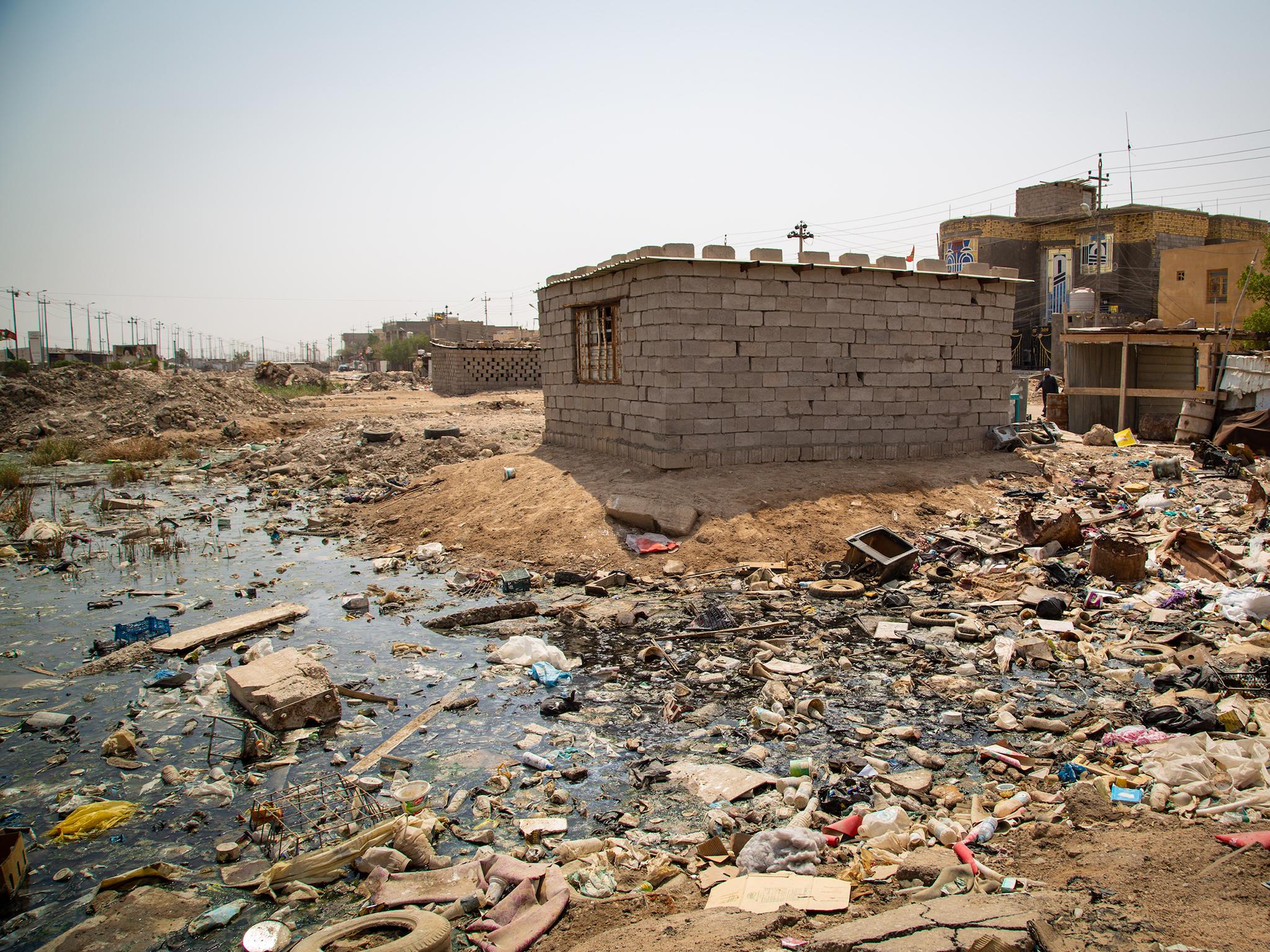
Despite death threats, alleged “assassination lists” and a wave of arrests, they still gather regularly to demand a new local government and immediate federal intervention in the city’s infrastructure.
The square feels tense. Intelligence officers, poorly disguised as disaffected youths, sidle up, filming the rally on their mobiles. Security forces, manning machine guns mounted on armoured vehicles, tighten their grip as marches draw near. People look at each other warily. Some hiss questions at us.
The hardcore cadre of dissenters say they have written out a list of demands, including holding the security forces to account for the deaths of protesters. They plan to present the demands to the governor, and if they are not addressed within a particular time frame, they will move to civil disobedience.
“It is not just the water. The whole of Basra has been destroyed by the political parties that rule us. They have used the money and power for the past 15 years to serve their own interests and to line their pockets, ” Kadim al-Sahlani, an academic, tells The Independent.
It is not just the water. The whole of Basra has been destroyed by the political parties that rule us
“We have a lot of problems with jobs, with housing, with education with security. Water just takes most of the attention. They keep promising us and we see nothing. The authorities have completely ignored the Basra people,” he adds.
Protesters say billions of dollars in emergency funding, pledged in July during the last wave of protests, had so far failed to materialise; so they have little faith in Abadi’s promises of yet more cash.
“Three billion dollars and 10,000 jobs were released to Basra government by the prime minister two months ago and the governor of Basra claimed no such thing happened,” Adham, 33, another protester says.
“The governor is from the same party as the prime minister. So how can you trust them?” he asks.
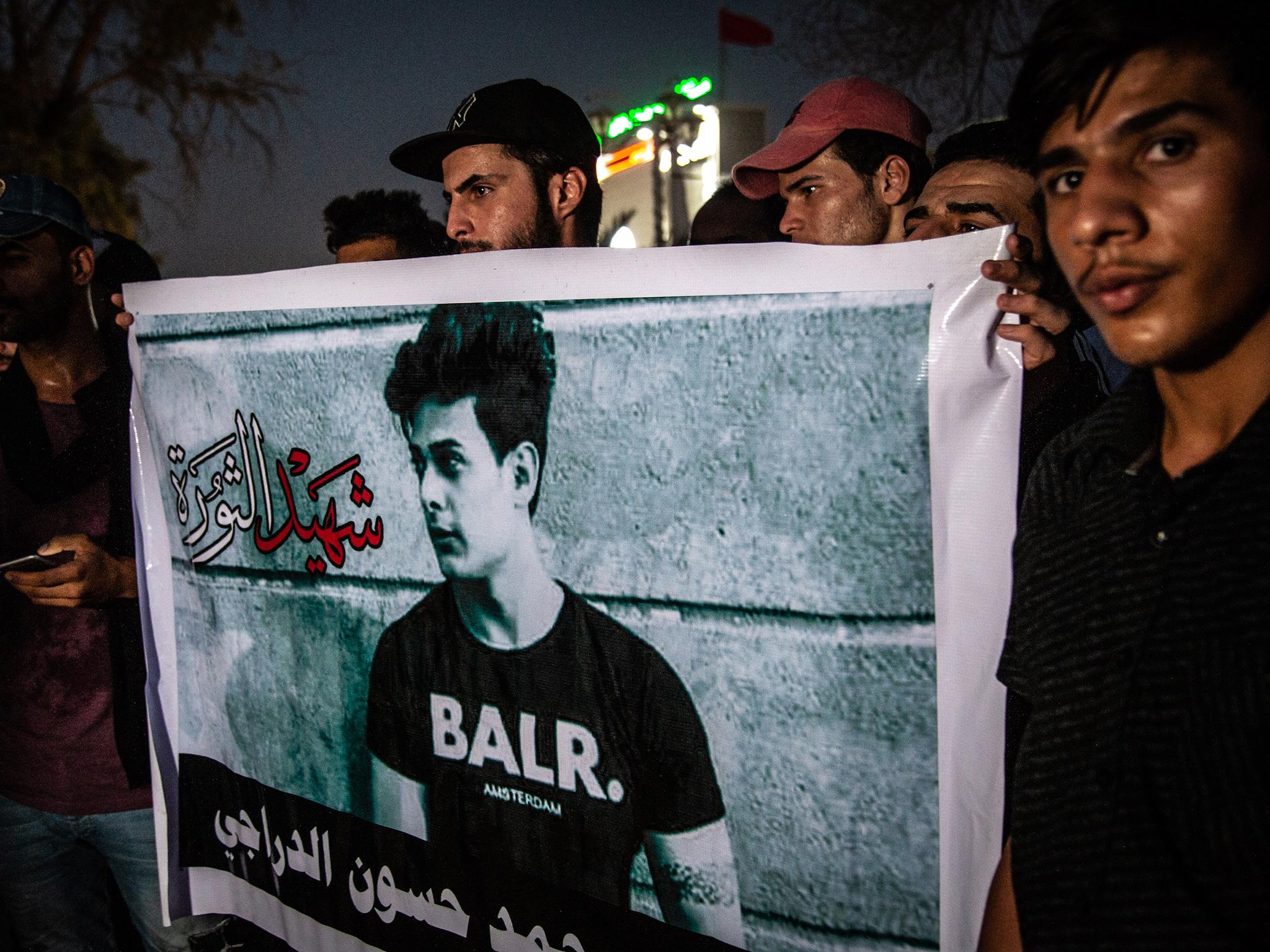
For the protesters and residents struggling to understand why this water crisis has happened, the answer is complicated. Experts and ministry officials speak of a “perfect storm” that have led to Basra’s – indeed all of Iraq’s – water woes.
Basra’s location downstream is at the unhappy end of a long food chain that stretches back to Syria, Turkey and Iran. And so the south of Iraq ekes out whatever miserable streams of water make their way from the increasingly emptying rivers, pounded by climate change, wasteful and ancient irrigation techniques, as well as upstream dams.
The water resources ministry told The Independent that dams in Turkey have already reduced the flow of the Euphrates by 55 per cent. It expects the same if not worse damage when Turkey begins to fill its new and controversial Ilisu dam in December, a process that could take up to five years.
But Basra’s crisis is a local one as well. Basra’s main drinking supply is sourced from the Shatt al-Arab channel, which begins where the Tigris and Euphrates merge and end. It stretches to the Arabian Gulf, where its fresh waters once flowed several kilometres out to sea.
The waterway is heavily polluted by agricultural runoff, industrial waste, oil production and sewage from both Iraq and neighbouring Iran, which is home to several of Shatt al-Arab’s tributaries.
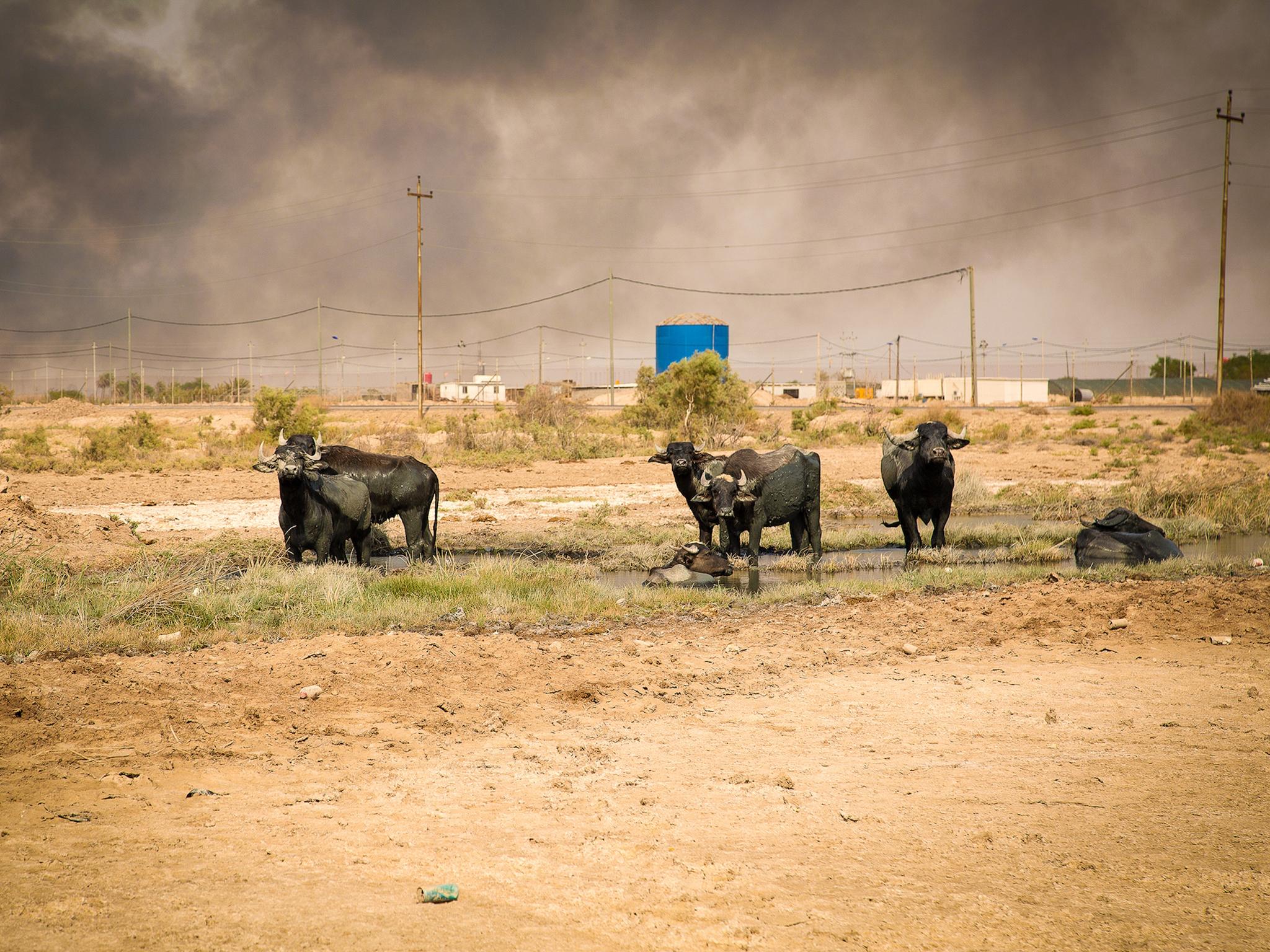
Low freshwater flow from the north of Iraq has meant that the sea from the Arabian Gulf has encroached nearly 100km up the waterway. This has seen salt levels soar to nearly six times the World Health Organisation-approved drinking level, according to the water resources ministry.
This summer has been particularly bad because of a dry winter: there was insufficient snow-melt to keep the rivers running properly, according to Schwartzstein, who wintered in the mountains of Kurdistan. Iraq’s surface temperature has gone up by nearly 2C because of global climate change, environment ministry officials say.
But for Schwartzstein, and numerous other experts The Independent spoke too, the heart of the crisis lies in out of control corruption.
For a start, a lot of Basra’s precious water supplies are illegally tapped, usually for thirsty operations like fish farms.
Despite multiple injections of cash, the network of water pipes, originally laid in the 1960s, has been left in such a woeful state of disrepair that any attempt to flush cleaner water through the system is wasted through massive leakage. Desalination and treatment plants can do little to extricate the massive levels of salt and dirt from Shatt al-Arab’s water, and so they splutter filth to the residents.
Shukri al-Hassan, marine science lecturer at Basra University, says this has meant “unprecedented” levels of pollution, which have increased fourfold over the past 10 years and are continually increasing.
“Different pollutants can be found in [Shatt al-Arab], including germs, chemicals, toxic algae coupled with unprecedented concentrations of salt almost like that of seawater: rather, it is indeed seawater,” he adds.
Water resources minister Hassan al-Janabi is frank about Iraq’s water woes from his private home in the Green Zone, Baghdad. He makes no secret of his disdain for the way other government bodies have dealt with the crisis.
The ministry provides raw water, but the treatment of it and delivery to homes is technically up to local government. Janabi admits there is confusion over the distribution of duties between central and local government. There are also questions over where the funding is going.
“Responsibility is never clear ... We don’t have one umbrella where everything is coordinated. This makes it hard to come up with a consolidated set of policies in terms of water management, drinking water supply, sewage treatment,” he says.
This is an accumulative effect of neglect, of mismanagement, of irresponsible programmes
He says his ministry is providing emergency raw water supplies to Basra in enormous storage basins but only 10 per cent of that additional supply is actually making it to the treatment plants because of chronic leakages.
He claims he had repeatedly advised the Basrawi authorities to stop pumping from Shatt al-Arab and instead go directly to the Tigris via a pre-existing canal further upstream. But due to the dilapidated pipe systems, which never appear to be repaired, that was not possible.
“This is an accumulative effect of neglect, of mismanagement, of irresponsible programmes,” Janabi says pointedly. “Basra used to have hundreds of millions of dollars over the year. Fixing the water supply was not a priority of local or central government.”
Basra’s embattled governor, Assad al-Eidani, has long blamed Baghdad for failing to deliver the funds to fix the water systems and has been vocal about his criticism of Iraq’s central authorities.
But a brewing internal war further complicated the crisis a few weeks ago, when the judiciary issued an arrest warrant against him. Iraqi media reported that a Basra police chief, who had been dismissed over the security response to the water crisis, had filed a defamation complaint against Eidani because he called him a thief in a recent parliament session.
In the grips of the crisis, Eidani declined repeated requests for an interview.
For the city’s impoverished residents, fed up of the internal squabbling and finger-pointing, scraping together enough money to purchase cleaner water from private companies is the only way of survival.
“The best we can do is buy a bit of good water and mix it with this rubbish,“ Shams Barrah, an illiterate mother-of-seven, explains, gesturing towards her sink, which has been chiselled away by salt.
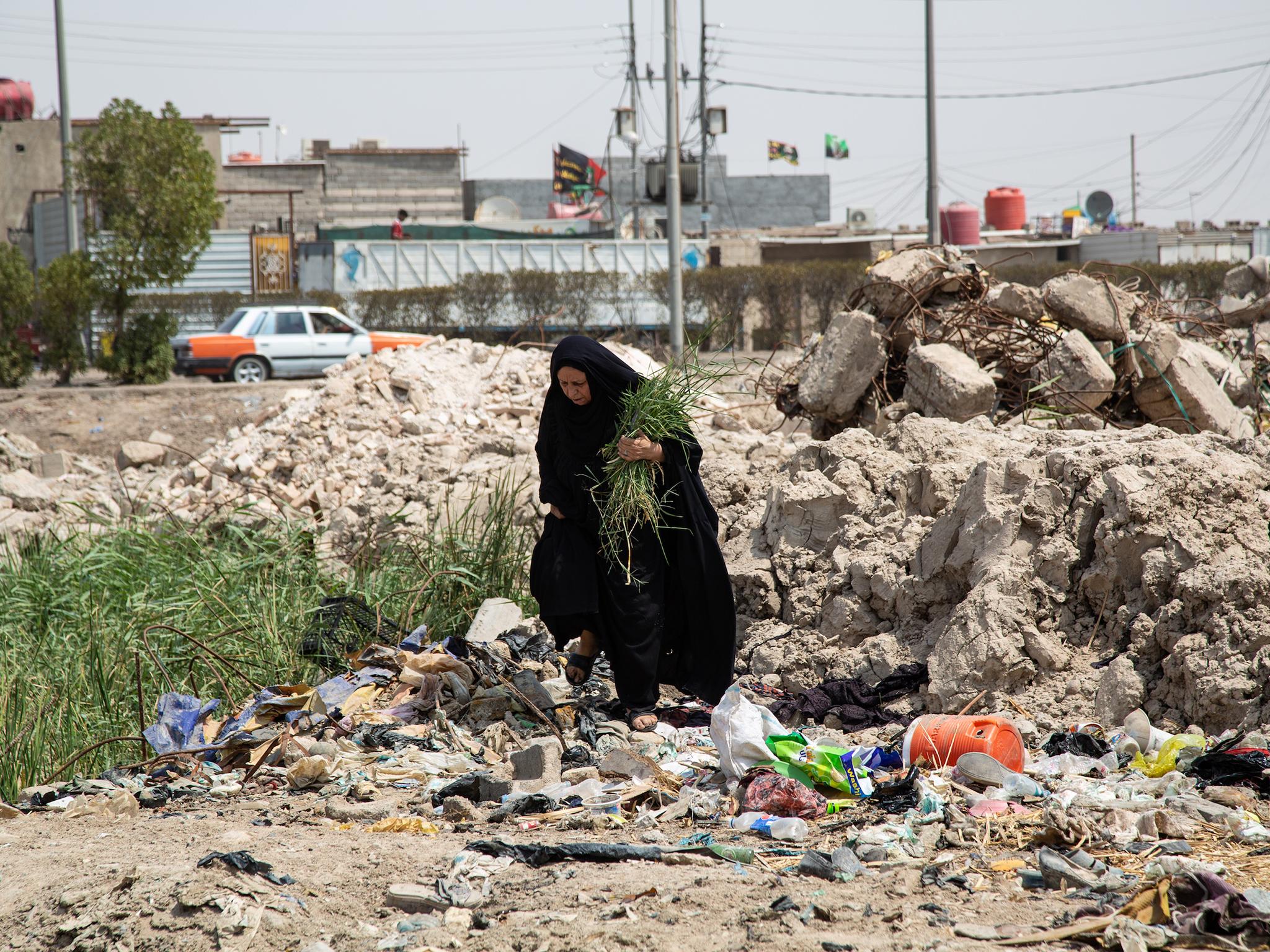
Her breeze-block house, in a different part of town, also looks out over a festering pond of sewage which thickens the air already unbreathable in the humidity. Residents say the local authorities have promised for over a decade that it would be a strip of gardens and playgrounds to line the main road that roars past. But like many promises, that never happened.
A tonne [1,000 litres] of non-drinkable but treated water can cost $15, which is too much for someone like Barrah, who makes her living selling bits of plastic found in rubbish dumps.
“We don’t know what the problem is. They keep saying they are going to fix it but in the last three weeks it’s actually got worse. Frankly I fear for my children.”
They keep saying they are going to fix it but in the last three weeks it’s actually got worse. Frankly I fear for my children
Back at the protests, as sundown draws near, a group of Basrawi poets begin to shout traditional revolutionary verses from within a scrum of people holding posters emblazoned with the faces of young people who were killed in the rallies.
Naqib al-Luaibi, 47, a local activist, nervously opens up about the mounting death threats and media attacks directed at protesters. He fears if the crisis continues, and the security forces open fire on young protesters again, tribes would intervene. The situation is a powder keg waiting to explode.
“They will kill the peaceful nature of the demonstration if this repression continues with weapons,” he says, with one wary eye on the security forces.
“The simplest thing now is you cannot even wash your face with the water. We are afraid to turn on the tap because the family and the kids will ingest it. Imagine being afraid of your tap?”
Join our commenting forum
Join thought-provoking conversations, follow other Independent readers and see their replies
Comments